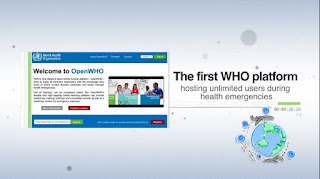#12,543
While it's been in the works for quite some time, and has already seen some limited use, overnight the World Health Organization notified journalists via email of the launch of the OpenWHO platform.
An interactive website which not only serves as an online training center for public health emergencies, but can also host up to 250,000 users simultaneously for briefings during a crisis.From the OpenWHO FAQ:
What is OpenWHO platform?
OpenWHO is WHO’s new interactive, web-based, knowledge-transfer platform offering online courses to improve the response to health emergencies. OpenWHO enables the Organization and its key partners to transfer life-saving knowledge to large numbers of frontline responders. As many as 250 000 people can use the platform and access emergency courses at any given time - during epidemics, pandemics and other health emergencies.
Who is using OpenWHO platform?
Users include governments, national and international responders as well as WHO’s own staff and experts, partners and practitioners, volunteers and students.
What will I find on OpenWHO platform?
OpenWHO hosts courses about high-threat pathogens for use by health emergency workers. During epidemics, pandemics and other emergencies, OpenWHO contributors will move quickly to add new and updated courses for immediate use. This will help the emergency response and will increase responders’ overall preparedness for future events. In addition to offering online learning, OpenWHO will provide users with technical resources and will host communities where they can practice the skills they have learned.
From today's WHO email:
Dear journalists,
Today, WHO is launching a series of video courses on epidemics, pandemics and health emergencies. Geared for those working in emergencies, the courses are also accessible to the public.
The courses – which are on a platform called OpenWHO – transform complex scientific knowledge into easy-to-understand introductory video lessons, using a smaller bandwidth so that people in any country can access them. Offline versions are available on both IOS and Android devices.
The platform can host an unlimited number of users and is free and open to anyone wishing to register.
OpenWHO has three main channels:
- Outbreak focuses on diseases that are epidemic or pandemic-prone such as Ebola, yellow fever and pandemic influenza.
- GetSocial! covers social science interventions such as risk communication, community engagement and social mobilization.
- Ready For Response offers courses on WHO’s emergency response framework, Incident Management System and pre-deployment trainings for people who might be sent to countries for emergency response.
In addition, there is a channel for partners in the Global Outbreak Alert and Response Network (GOARN), which provides them with the training necessary to participate in responses.
All courses are in English and many are also available in Arabic and French. To ensure that everyone involved in emergency response has the latest science and operational information, WHO makes some courses available in local languages and dialects during epidemics and emergencies. For example, during the recent Ebola outbreak in the Democratic Republic of the Congo, WHO translated the Ebola introductory course on the platform into Lingala, the local language most used in the epicentre.
The video courses can be accessed here:
There are currently 10 online courses available (with 7 more announced), ranging from an Introduction to MERS to Public health interventions in the pandemics and epidemics. While I've not had time to take any of these courses, I'm looking forward to doing so.
At some point I'll report back on what I find.In the meantime, this looks to be an informative, and potentially invaluable resource, and one which I hope a lot of people will take advantage of.
